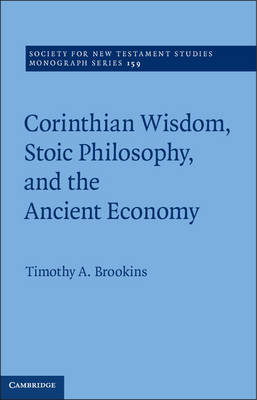
Corinthian Wisdom, Stoic Philosophy, and the Ancient Economy
Seiten
2014
Cambridge University Press (Verlag)
978-1-107-04637-5 (ISBN)
Cambridge University Press (Verlag)
978-1-107-04637-5 (ISBN)
This work re-examines the divisive wisdom in 1 Corinthians on the basis of consistent discourse similarities between the views of the Corinthians and the Stoic system of thought. Brookins argues that access to philosophical training moved the church's wealthier members to conflate Paul's message with Stoicism, resulting in disturbances within the church.
This work re-examines the divisive wisdom that Paul addresses in 1 Corinthians. Challenging the recent consensus that the Corinthians' wisdom was rooted primarily in the Greco-Roman rhetorical tradition, Timothy A. Brookins offers a revisionary thesis centered on discourse similarities between the perspective of the Corinthian 'wise' and the Stoic system of thought. Brookins argues that several members of the church, after hearing Paul's initial gospel message, construed that message in terms of Stoic philosophy and began promoting a kind of 'Stoic-Christian' perspective that helped to precipitate divisions in the church. Being apprised of their views, Paul then exploited the 'Stoic' discourse of his opponents in order to sustain common discursive ground. In addition to providing a fresh synthesis of the data in 1 Corinthians, Brookins brings in cutting-edge research on the ancient economy as he explores questions related to philosophical education and social status within the church community.
This work re-examines the divisive wisdom that Paul addresses in 1 Corinthians. Challenging the recent consensus that the Corinthians' wisdom was rooted primarily in the Greco-Roman rhetorical tradition, Timothy A. Brookins offers a revisionary thesis centered on discourse similarities between the perspective of the Corinthian 'wise' and the Stoic system of thought. Brookins argues that several members of the church, after hearing Paul's initial gospel message, construed that message in terms of Stoic philosophy and began promoting a kind of 'Stoic-Christian' perspective that helped to precipitate divisions in the church. Being apprised of their views, Paul then exploited the 'Stoic' discourse of his opponents in order to sustain common discursive ground. In addition to providing a fresh synthesis of the data in 1 Corinthians, Brookins brings in cutting-edge research on the ancient economy as he explores questions related to philosophical education and social status within the church community.
Timothy A. Brookins is Assistant Professor of Classics at Houston Baptist University. His research focuses on New Testament backgrounds, with a primary emphasis on the Pauline epistles. He has published articles in numerous journals, including New Testament Studies, the Journal of Theological Studies, and the Journal for the Study of the New Testament.
1. Introduction; 2. Rhetoric versus philosophy in 1 Corinthians; 3. Method; 4. The Corinthian social world; 5. The 'wise man' among the Corinthians; 6. Loose ends; 7. Conclusion.
| Reihe/Serie | Society for New Testament Studies Monograph Series |
|---|---|
| Zusatzinfo | 9 Tables, unspecified |
| Verlagsort | Cambridge |
| Sprache | englisch |
| Maße | 147 x 223 mm |
| Gewicht | 450 g |
| Themenwelt | Geisteswissenschaften ► Philosophie ► Philosophie Altertum / Antike |
| Religion / Theologie ► Christentum ► Kirchengeschichte | |
| ISBN-10 | 1-107-04637-8 / 1107046378 |
| ISBN-13 | 978-1-107-04637-5 / 9781107046375 |
| Zustand | Neuware |
| Haben Sie eine Frage zum Produkt? |
Mehr entdecken
aus dem Bereich
aus dem Bereich
von Athanasius bis Gregor dem Großen
Buch | Softcover (2024)
C.H.Beck (Verlag)
CHF 18,90
eine Geschichte der christlichen Kunst
Buch | Hardcover (2024)
C.H.Beck (Verlag)
CHF 44,75


